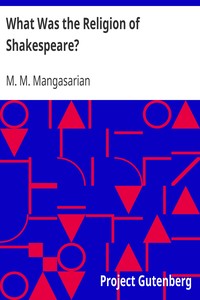What Was the Religion of Shakespeare? by M. M. Mangasarian
"What Was the Religion of Shakespeare?" by M. M. Mangasarian is a philosophical examination of William Shakespeare's religious beliefs, articulated in the form of a lecture delivered in the early 20th century. This book delves into the complexities of Shakespeare's views on religion, positing that the playwright's works reflect a naturalistic and rationalist philosophy rather than adherence to conventional supernatural faiths. Written in the early 1900s, it serves as a critical analysis
of Shakespeare's writings against the backdrop of the religious discourse of his time. In this text, Mangasarian argues that Shakespeare's works indicate a skepticism towards traditional religious doctrines and supernatural interpretations of existence. He explores various critical perspectives on Shakespeare's belief—or lack thereof—in Christianity and other organized religions, suggesting that Shakespeare transcends these categories by espousing a general ethic rooted in humanity's goodness, beauty, and truth. Through careful analysis of passages from plays like "Hamlet," "Macbeth," and "Romeo and Juliet," Mangasarian asserts that Shakespeare embraces a humanistic worldview where individual agency, rather than divine providence, shapes human destiny. This portrayal illuminates Shakespeare not as an irreligious figure, but as one who fosters a philosophy grounded in naturalism and moral integrity. (This is an automatically generated summary.)
Read or download for free
| How to read | Url | Size | |||
|---|---|---|---|---|---|
| Read now! | https://www.gutenberg.org/ebooks/45293.html.images | 73 kB | |||
| EPUB3 (E-readers incl. Send-to-Kindle) | https://www.gutenberg.org/ebooks/45293.epub3.images | 113 kB | |||
| EPUB (older E-readers) | https://www.gutenberg.org/ebooks/45293.epub.images | 111 kB | |||
| EPUB (no images, older E-readers) | https://www.gutenberg.org/ebooks/45293.epub.noimages | 80 kB | |||
| Kindle | https://www.gutenberg.org/ebooks/45293.kf8.images | 265 kB | |||
| older Kindles | https://www.gutenberg.org/ebooks/45293.kindle.images | 263 kB | |||
| Plain Text UTF-8 | https://www.gutenberg.org/ebooks/45293.txt.utf-8 | 58 kB | |||
| Download HTML (zip) | https://www.gutenberg.org/cache/epub/45293/pg45293-h.zip | 113 kB | |||
| There may be more files related to this item. | |||||
Similar Books
About this eBook
| Author | Mangasarian, M. M. (Mangasar Mugurditch), 1859-1943 |
|---|---|
| Title | What Was the Religion of Shakespeare? |
| Credits |
Produced by David Widger from page images generously provided by the Internet Archive |
| Reading Level | Reading ease score: 54.7 (10th to 12th grade). Somewhat difficult to read. |
| Language | English |
| LoC Class | PR: Language and Literatures: English literature |
| Subject | Religion in literature |
| Category | Text |
| EBook-No. | 45293 |
| Release Date | Apr 1, 2014 |
| Most Recently Updated | Oct 24, 2024 |
| Copyright Status | Public domain in the USA. |
| Downloads | 232 downloads in the last 30 days. |
| Project Gutenberg eBooks are always free! | |

